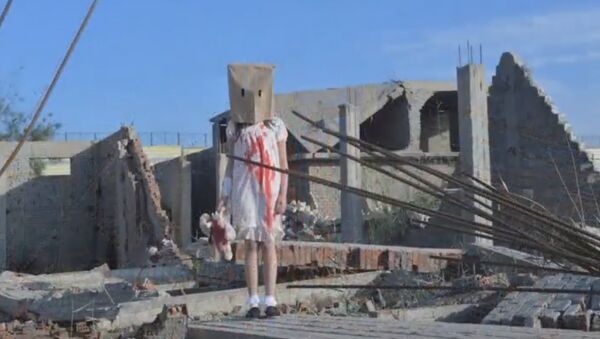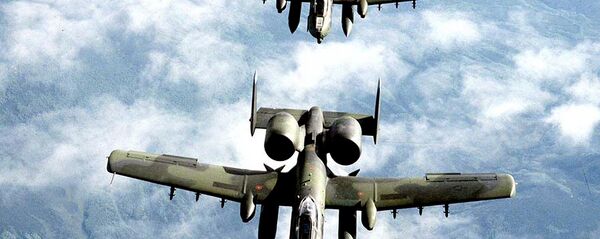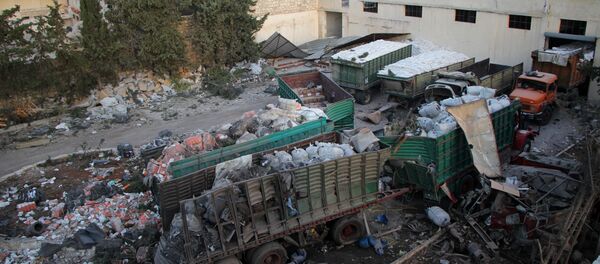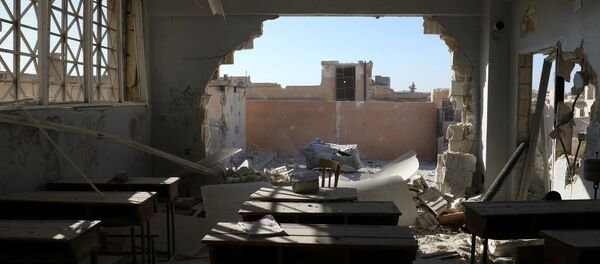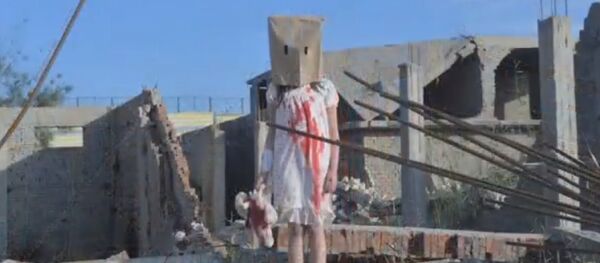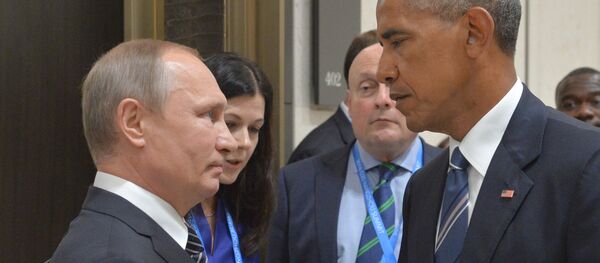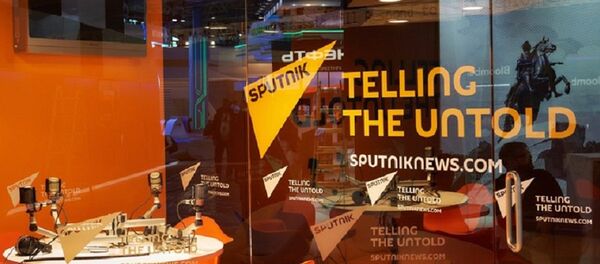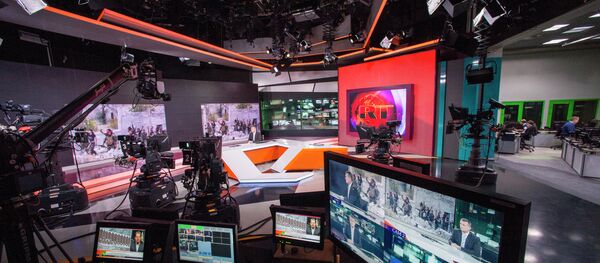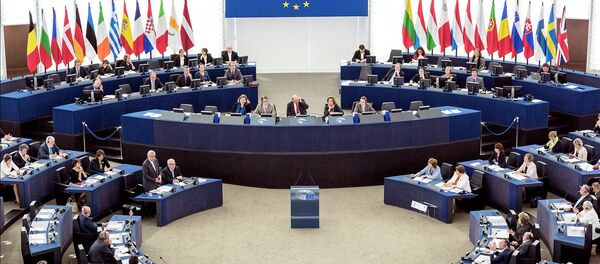MOSCOW (Sputnik) — The idea that media is used to shape public opinion is certainly not new, and was a defining feature of Cold War relations between the United States and the Soviet Union.
2016 saw a number of events which have triggered a media flurry – from Syria to leaked emails of Democratic US presidential candidate Hillary Clinton.
Information Warfare on Syria Crisis
Despite having the single goal of liberating Syria from Daesh, the United States and Russia see this being achieved through vastly different methods and tactics. The US side has claimed that Moscow targets moderate opposition, while Washington itself is seeking to oust Syrian President Assad. The Russian side, however, insisted that the Jabhat Fatah al Sham (formerly known as al-Nusra Front) should also be a target and accused Washington of supporting terrorist groups in order to achieve its aims.
Russia’s interest in the conflict in Syria has come under continuous scrutiny, with allegations of prolonging the conflict to ensure the success of Assad. In late October, a Reuters analysis of the Russian Defense Ministry data stated that almost 80 percent of Russia's declared targets in Syria have been in areas not held by Daesh. According to the analysis, the areas were predominantly held by other groups opposed to the Syrian president, which include al-Qaeda and militant groups backed by the US-led coalition. Moscow denied the allegations, and Russian Foreign Minister Sergei Lavrov told RT that their "targets are solely the positions of objects and equipment belonging to the armed terrorist group ISIL [Daesh]."
The Syrian military condemned the airstrike, which resulted in the deaths of 62 Syrian servicemen, stating that it represented "conclusive evidence" of the US and its allies' support of Daesh. Commenting on the event, Russian military spokesman Maj. Gen. Igor Konashenkov stressed that the blame for the attack, if it was "caused by erroneous information," was on the United States, for the unwillingness to coordinate its actions with Russia.
When Washington commented on the attack, US Ambassador to the United Nations Samantha Power surmised that if US-led coalition airstrikes did hit Syrian forces, it was unintentional, and chose to instead allege that the Syrian government "has been intentionally striking civilian targets with horrifying, predictable regularity."
The Russian military later unveiled video footage of the convoy, which showed a militant's pickup vehicle carrying a large-caliber mortar as part of the convoy. The Russian Defense Ministry also revealed that an aerial drone belonging to US-led coalition operated near Urum al-Kubra area north of Aleppo at the time of the attack, which Washington denied. The perpetrators of the attack were accused of war crimes, and allegations cast by both sides led to a lengthy impasse in relations.
Both sides have similarly come under fire for their indiscriminate air strikes and targeting civilian infrastructure, in particular hospitals, in Syria’s Aleppo. According to the New York Times newspaper, Russian airstrikes in Syria, although "initially intended to draw Moscow closer to the West, they have instead alienated a world outraged by attacks on civilians." The US-led coalition has faced a similar onslaught of criticism from international news outlets, as well as from Russian state representatives and media. Al-Jazeera reported that the coalition’s July strikes on northern Manbij killed 56 civilians, bringing death toll to 167 in June-July.
In February, the bombing of two hospitals in the Aleppo sparked controversy as neither side would accept responsibility. RT reported that "US A-10s bombed city of Aleppo on Wednesday, shifted blame onto Moscow," citing the Russian Defense Ministry, while NBC responded with a report that a senior State Department official denied the allegations, saying that Russian reports were "false," and that the United States did not carry out any missions over Aleppo on the days in question.
Russia's permanent representative to the United Nations, Vitali Churkin, in November, countered claims made by the US State Department spokesman John Kirby that five Aleppo hospitals were destroyed, by branding the statements on the number of civilian casualties in Aleppo "blatant propaganda." Churkin questioned which hospitals were bombed, and highlighted the lack of information provided by the State Department, adding that Russian Air Forces "have not launched air strikes since October 18."
According to Russian Defense Ministry's spokesman Maj. Gen. Igor Konashenkov, the "publication of yet another 'war crime' accusations by Human Rights Watch after more than a week, when some phone 'interviews' of seven aggrieved people are provided as new 'evidences' do not stand up to any scrutiny and is yet another information attack." The Russian official stated that the Russian ministry had already published evidences proving that the school buildings had not been bombed, but the area where the school is situated has been occupied by terrorists from the Jabhat Fateh al-Sham group.
Allegations made by SOHR that claimed Russian combat jets bombed hospitals in Aleppo were heavily denied, with Russian officials warning that the organization should not be counted among the list of "credible aid agencies" that Kirby had assigned it to.
Speaking on mainstream media coverage of Aleppo, Nicolas Dhuicq, a member of the French National Assembly's defense committee, told Sputnik that, "any success of Bashar Assad is severally downplayed or met with opposition." He added that "media coverage depends on whether the deaths occur in eastern or western Aleppo. The Western media focus on the deaths in eastern Aleppo but never cover western Aleppo. The media also did not report on Islamists using civilians as human shields and that they managed to hinder evacuation of families that were trying to flee the war."
While Moscow asserts that it is fighting Daesh extremists in Syria, the vast majority of its airstrikes have targeted opposition groups threatening the Assad government," as part of their fact check comments on the presidential debate. The statement was later corrected its initial ‘Not true’ assessment to ‘Only partially true,’ stating that Syrian President Bashar Assad’s military "is mainly focused on combating Syrian opposition."
Meddling in Elections?
In an article published by the Washing Post, a number of research groups found evidence of influence exerted by Russia on the election, contributed to creating an image of "Clinton as a criminal hiding potentially fatal health problems and preparing to hand control of the nation to a shadowy cabal of global financiers."
Most notably, the Democratic Party claimed that Russia interfered with the election by hacking and distributing Democratic National Committee (DNC) emails. On July 22, whistleblowing website WikLeaks published almost 20,000 pages of hacked emails concerning the Clinton campaign. The emails demonstrated a concerted effort by top committee members to undermine Sanders’ campaign in favor of Clinton. Robby Mook, her campaign manager, told CNN that the emails were released just months ahead of the November 2016 election to help Trump in the race for presidency.
US claims were denied by official Russian sources but became the backbone of the Clinton campaign, used to demonstrate Trump’s association with Russia. Clinton’s foreign policy advisor Jake Sullivan stated that evidence of Russian government-sponsored entities being behind the cyberattack "would be Russia interfering in the American presidential election."
In response to allegations by media and the Clinton campaign, Trump tweeted, "the new joke in town is that Russia leaked the disastrous DNC e-mails, which should never have been written (stupid), because Putin likes me."
German media has likewise stoked the fire of election hacking fear with regard to 2017 elections in the country. The Frankfurter Allgemeine Sonntagszeitung (FAZ) newspaper, on December 4, cited a government source, who said that "there are no doubts that Russia will be intensively trying to influence the election campaign."
The paper expressed concerns over cell operators being targeted, the spread of misinformation and cyberattacks being deployed to influence the outcome of the elections. German Chancellor Angela Merkel already raised the concern in November, saying she did not rule out Russia's interference with Germany's 2017 election through Internet attacks and spreading false information. Kremlin spokesman Dmitry Peskov dismissed the rumors as groundless, while Russian Foreign Ministry head Andrei Kelin responded by denouncing the fears as "both paranoia and, no doubt, is an attempt to exploit the feelings of voters for own benefit."
Censorship?
Yahoo News reported in September on the declassified summary of the report, by the office of Director of National Intelligence James Clapper, which made reference to RT and Sputnik as tools of targeting extreme factions in the West and providing "disproportionate coverage and airtime to the European Parliament’s more extreme factions."
In November, the US Congress agreed to fund $160 million, as part of the National Defense Authorization Act, to battle what they claimed to be foreign propaganda and an alleged Russian campaign to spread "fake news." The Intelligence Authorization Act makes provisions for the establishment of an "executive branch interagency committee to counter active measures by the Russian Federation to exert covert influence over peoples and governments."
As many as 304 members of the European Parliament supported the resolution based on the ‘EU strategic communication to counteract propaganda against it by third parties’ report, with 179 voting against it and 208 abstaining.
The report also mentioned some "social media and internet trolls" from Russia who are thought to "challenge democratic values." The resolution also drew a parallel between Russian media and the propaganda disseminated by Daesh.
The resolution caused a wave of outrage across journalistic organizations and the office of Dunja Mijatovic, in charge of freedom of the media at the 57-nation Organization for Security and Co-operation in Europe (OSCE), released a statement saying it "will closely observe what practical actions will follow and be alert to potential freedom of the media issues."
Anna Belkina, RT's head of communications speaking in the UK Parliament's Foreign Affairs Committee responded by saying, "we do see, disappointingly, this trend among some establishment political figures as well as in the media to try to immediately delegitimize and dismiss RT for… asking inconvenient questions or for putting forward viewpoints might be challenging the established narratives." The resolution has been called undemocratic and been linked to censorship by journalists and their representatives in Turkey, Egypt, some Latin American states and many other countries. The Swiss Press Club’s President Guy Mettan suggested in a comment to RIA Novosti that "the European Union is able to protect the freedom of expression only by resorting to prohibition of another side."
New Battlefront
The steps taken to counter Russian alleged propaganda have been attributed to a number of factors, from a rise in Russophobia, as Russia's Permanent Representative at the OSCE Alexander Lukashevich termed it, to the European Union’s need of "an enemy, be it Russia or any other," as French Member of the European Parliament Jean-Luc Schaffhaueser told RT.
As Bruno Ballardini, an Italian communication strategist told Sputnik, "geopolitical interests take on the form of news stories and become propaganda. If you can persuade people that a country is good or bad, this may affect economy, trade and politics. Unfortunately, modern wars are being waged in the sphere of information." Therein lies the danger of Russian and international media.
Information warfare is proving to be a rising threat due to the reliance on social media and the targeted use of controversial "clickbait" headlines, to grab readers’ attention. The Syrian crisis has proven to be a watershed for the media’s influence in altering policy and global attitudes, with Russian and US media fighting to disprove each other’s stories. Media and information warfare will likely remain a key factor in international relations, and will continue to determine foreign policies and global social attitudes in 2017.
